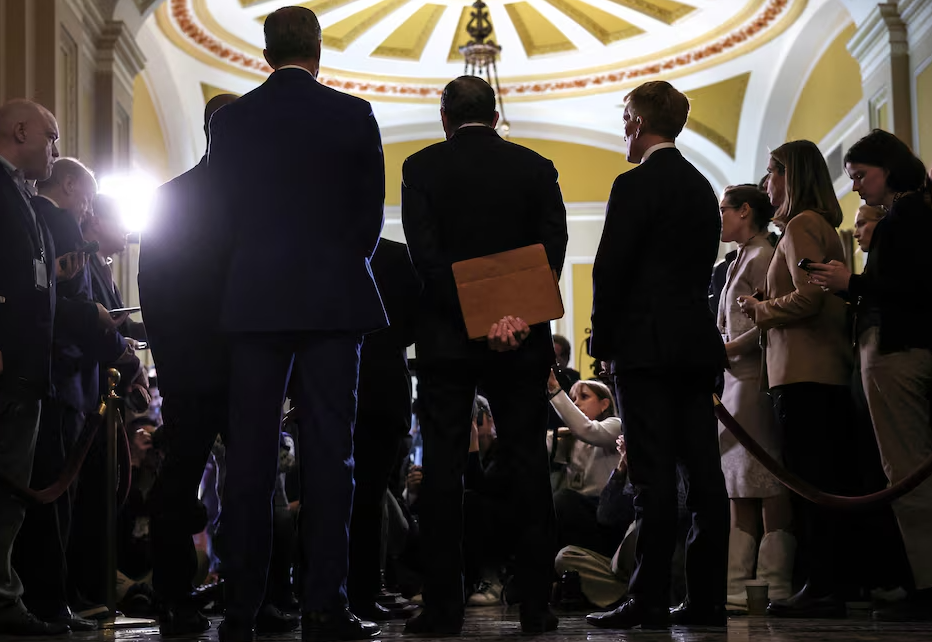
Senate Republican leaders hold a press conference following the weekly Senate caucus luncheons on Capitol Hill in Washington, D.C., Jan. 28, 2025.
WASHINGTON (Reuters) — U.S. House Republicans face a major test this week as the fractured and narrow caucus tries to unify around a plan to advance President Donald Trump’s agenda for trillions in tax cuts and new spending on defense and border security.
With only a 218-215 majority in the House of Representatives, Speaker Mike Johnson can afford to lose just one vote on any measure that all Democrats vote against. He faces resistance from as many as a dozen Republicans over a budget resolution that would allow congressional committees to begin crafting full-scale legislation to enact the Trump agenda.
The House resolution calls for $4.5 trillion in tax cuts — a concern to lawmakers worried about the nation’s growing $36 trillion in debt — and calls for $2 trillion in cuts to spending — which have worried some lawmakers that their constituents could lose out on key services.
“What could go wrong, right?” Johnson joked during an appearance before the Conservative Political Action Conference last week.
“But everybody — everybody — is committed to delivering the America First agenda, and that’s why we’re going to get it done,” said Johnson, of Louisiana.
Republicans in both the House and Senate need to pass the measure to unlock a key part of their strategy: a parliamentary tool allowing them to circumvent the Senate filibuster and opposition from Democrats.
But that is only one feat awaiting lawmakers over the coming weeks. Congress also needs to avert a partial government shutdown after March 14, when funding runs out and then raise the nation’s debt ceiling or risk a catastrophic default at mid-year.
Trump commands fealty from congressional Republicans — most visibly by succeeding in securing Senate approval for all his Cabinet nominees so far, including controversial choices such as vaccine skeptic Health and Human Services Secretary Robert F. Kennedy Jr. and Tulsi Gabbard, his director of national intelligence, who raised concern with past statements seeming to express support for U.S. adversaries.
Ukrainian President Volodymyr Zelenskiy said on Sunday that he’s willing to step down if it would bring peace to Ukraine, even suggesting he could trade his resignation for his country’s NATO membership.
Freedom caucus demands
House Republicans have yet to unify around the plan, despite buy-in from the ultraconservative House Freedom Caucus, a group of roughly three dozen hardliners whose demands have plagued a series of House speakers over the past decade.
The Freedom Caucus embraced the resolution after the House Budget Committee increased the target for spending cuts from $1.5 trillion to $2 trillion while preparing the resolution for a floor vote this week. The change has raised concerns among other Republicans over a clause that calls for tax cuts to be pared back to compensate for any shortfall in spending cuts.
The higher target for spending cuts has raised concerns among lawmakers who worry about the impact on food assistance, education grants and the Medicaid health insurance program for the poor, especially for Hispanic communities that helped give Republicans their trifecta of control over the White House and both chambers of Congress.
“Some members are between undecided and ‘lean no’ on the resolution. Many of us still need clarity from leadership on where these savings will be coming from,” said Representative Nicole Malliotakis, one of eight Republicans who expressed their concerns to Johnson in a February 19 letter.
“I need answers to some questions about how we’re going to achieve that without hurting Medicaid populations. That’s kind of where I’m at,” Malliotakis, of New York, said in an interview.
She said she would like to see savings from billionaire Elon Musk’s Department of Government Efficiency, or DOGE, put toward the spending cut target as a way of protecting services to her constituents.
Trump envisions DOGE dividend
Trump has complicated matters by saying he could decide to send 20% of any funds saved by Musk’s efforts directly to Americans.
Johnson discouraged the idea during his CPAC appearance, saying: “Fiscal responsibility is what we do as conservatives. That’s our brand. And we have a $36 trillion federal debt … I think we need to pay down the credit card.”
Johnson’s conference also remains vulnerable to potential infighting over other hot-button issues including a proposed increase in the federal deduction for state and local taxes and fiscal mavericks who could demand higher cuts in spending.
“Almost no one in Congress is serious about cutting spending. They’re cowards,” Representative Thomas Massie, an independent fiscal hawk and Johnson critic from Kentucky, lamented on the social platform X last week.
Doubts about House Republicans’ unity prompted Senate Republicans to enact their own budget resolution as a Plan B ploy last week: a $340 billion measure that covers Trump’s border, defense and energy priorities but leaves the thornier issue of tax policy for later in the year.











